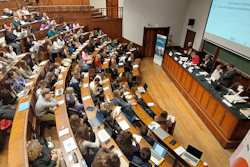Terry Burte from Paris 1 Panthéon-Sorbonne University is in charge of the conceptualisation of joint degrees and courses in the framework of Una Europa’s 1Europe project. Maria Gravari Barbas is member of Una Europa’s Board of Directors and Vice-President for International Relations at Paris 1 Panthéon-Sorbonne University.
We have asked Maria and Terry about the opportunities and challenges linked to innovating European higher education programmes.
How do the degrees and courses created in the framework of 1Europe differ from what already exists?
Terry Burte: We are pushing the boundaries of what is currently feasible under the rules of the European Higher Education and Research Area in terms of creating joint degrees and courses. Our common aim is to achieve accreditation in eight countries of the following joint programmes: two joint bachelor's degrees in European Studies and Sustainability, one Una Europa module based on the principles of micro-qualifying programmes at Master’s level, a joint doctoral programme in Cultural Heritage and three inter-university continuous education certificates.
This educational dimension is closely intertwined with the development of new and accessible ways of physical and virtual mobility for students, academic and administrative staff. Each joint degree also has to comply with common educational guiding principles. We strive to develop joint programmes which offer innovative courses based on collaborative work between students from all the universities of the alliance. At the same time we want our students to solve concrete problems of general European interest and to develop transversal competences for better employability.
The scale at which we aim to introduce joint degrees, the way we consider social aspects of mobility and the importance we attach to systematic integration of innovative pedagogies – these are the central elements constituting the DNA of the programmes Una Europa wants to offer in the coming years.
Maria Gravari Barbas: All our diplomas are firmly anchored and embedded in joint research. Una Europa works at two levels. First, at a general level, that of all eight universities, where we focus on collaborating on research infrastructures, the linking of teams and Open Science.
Second, Una Europa comes in at the specific level of the fields of stud. Several projects are vectors for structuring research in four priority themes or Focus Areas of Una Europa (Sustainability, European Studies, Cultural Heritage and Data Sciences & Artificial Intelligence). In Cultural Heritage, for example, it was possible to define cross-cutting and interdisciplinary research themes common to all 8 universities. In the months to come, these will give rise to several initiatives (symposia, research seminars, etc.).

Maria Gravari-Barbas
Which are the main challenges Una Europa has to address when building European degrees?
Maria Gravari Barbas: The real difficulties are not content-related, but stem from the existing national and European regulations. While it makes perfect sense to develop European, disciplinary or multidisciplinary, transnational and multilingual degrees, national regulations are very heterogeneous. The creation of a common bachelor's, master's or doctoral degree between all Una Europa universities implies the prior and in-depth harmonization of eight national systems. Today, there is no real framework at European level to allow for the creation of true European degrees. This requires a real willingness by the Member States and the EU.
The route taken by the first 17 European Universities funded under Erasmus+ is very bottom-up and implies ad-hoc solutions. It will undoubtedly be necessary in the years to come to think about an adequate European framework allowing for the implementation of real European diplomas.
In light of these overarching challenges, how do you practically manage to design these joint degrees and courses?
Terry Burte: The creation of joint degrees and courses with eight partners is a long and technical process that needs to gather all the players involved. Our 1Europe project is a unique opportunity to foster transnational cooperation between academic and administrative staff to achieve these concrete results. Although our universities maintain very close relations, national regulations for higher education or continuous education still differ significantly from one country to another. In order to overcome these regulatory challenges, a group of 15 experts representing each university and chaired by Paris 1 Panthéon-Sorbonne - the Teaching and Learning Cluster - supports academics in the development of joint degrees. They also provide advice based on the best practice in innovative pedagogies implemented within the alliance and beyond.
The scientific content of courses is designed by nearly 40 academics grouped in four Self Steering Committees organised according to the Focus Areas defined for the 1Europe project: Cultural Heritage, Sustainability, Data Sciences & Artificial Intelligence and European Studies. This set-up has created a very dynamic professional community focused on the implementation of the joint degrees and courses.
Do you believe a European Higher Education Area is really possible?
Maria Gravari Barbas: Yes, absolutely. Of course, this implies a real willingness on the part of the Member States and the European Union. The European education and research area is not only possible, but crucial and necessary. It will allow us to train true European citizens who are multilingual, cosmopolitan and ready to embark on careers on a European scale.
So can we expect that Una Europa’s new degree types and certificates will be implemented in other fields?
Terry Burte: In addition to the creation of the seven joint degrees and certificates in the four Focus Areas by 2022, 1Europe has foreseen to establish a working methodology that will facilitate the future implementation of joint degrees in any other field. Each academic from the alliance wishing to develop a new joint programme within the framework of Una Europa will directly benefit from the experience accumulated in the implementation of the pilot programmes and will be able to fast-track their own European projects. We hope that ultimately, our methodology will also be a useful inspiration for other like-minded institutions and alliances.



